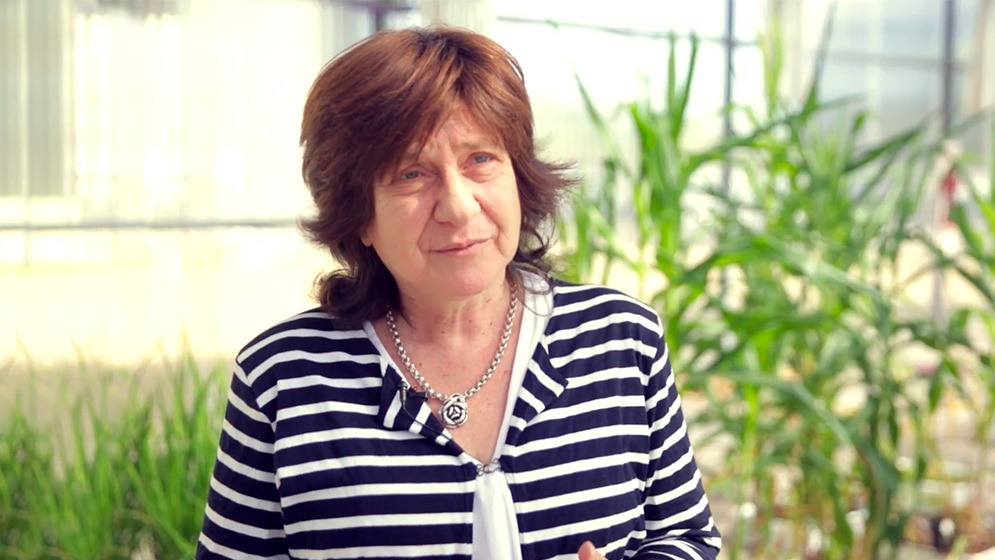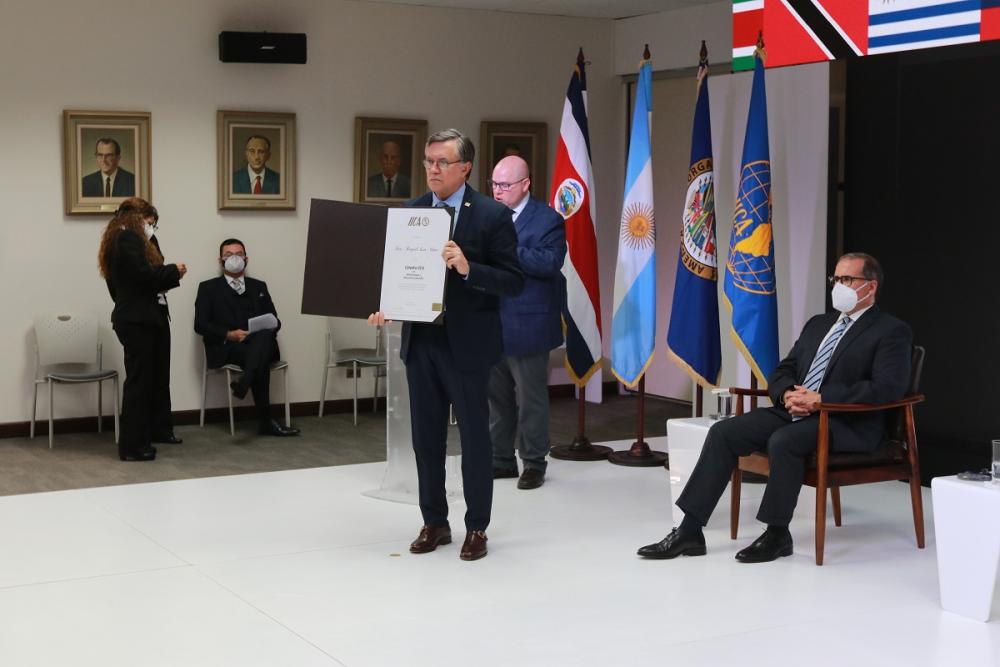As a researcher, Dr. Chan led the development of the HB4 gene, which comes from sunflowers and provides wheat and soybeans with greater tolerance to droughts.

San Jose, 18 January 2022 (IICA). Raquel Lía Chan, an Argentinian biochemist specializing in plant biotechnology, who led the development of the HB4 gene, which comes from sunflowers and provides wheat and soybeans with greater tolerance to droughts, was conferred the title of “IICA Chair in Biotechnology and Sustainable Development” in recognition of her contribution to strengthening national science and technology systems.
The award was presented at the swearing-in ceremony of the Director General of the Inter-American Institute for Cooperation on Agriculture (IICA), Manuel Otero, who assumed his second term (2022-2026) at the helm of the international organization. In attendance were the ministers, secretaries and deputy ministers of Agriculture of the Americas, as well as high-level international officials.
The Minister of Agriculture, Livestock and Fisheries of Argentina, Julián Domínguez, and the psychiatrist and founder of Grupo Insud, Hugo Sigman, participated in the ceremony to bestow the title on Chan, a researcher at the National Council for Scientific and Technical Research (CONICET), who works at the Institute of Agrobiotechnology of the Litoral (IAL), in the Argentinian province of Santa Fe.
A tenured professor at Universidad Nacional del Litoral (Argentina) and an expert in Molecular Biology, Chan’s research and work specializes in plant response to the environment.
“This is not just an award for me. It provides me with an opportunity to reiterate my commitment to working together to produce plants that are more than just food, because plants provide us with so much more – not just oxygen, but, as we often forget, our clothes, furniture and most medicines. Therefore, plan production is a pillar of life”, stated Chan.
Chan, who holds a doctoral degree from the National University of Rosario and a postdoctoral degree from the Institute of Plant Molecular Biology of the Louis Pasteur University in Strasbourg, France, pledged to continue fostering “better science and education, as well as training qualified individuals who can multiply and improve knowledge” to create a “better world”.
“Our countries need more developments that allow for producing more with the same resources and in an environmentally friendly manner. That is why we need more science, quality education and communication – a pillar we often forget about. We must be able to communicate what we do in the field of science, for the benefit of everyone”, she said.
Also in attendance at the ceremony was the Minister of Agriculture, Livestock and Fisheries of Argentina, Julián Domínguez, who referred to the work carried out by Dr. Raquel Chan, noting that “she has made an extraordinary scientific contribution to research on drought resistance of seeds, and I am therefore delighted that she is receiving well-deserved recognition from IICA today”.
During the conferral of the title, the Undersecretary for Policy Coordination of the Ministry of Agriculture, Livestock and Fisheries of Argentina, Ariel Martinez, stressed the fact that “individuals such as Dr. Chan provide a clear example of the importance of continuing to strengthen our scientific and technological systems, as well as fostering public-private cooperation and serving the interests of our producers”.
Sigman, who is also an IICA Goodwill Ambassador in Sustainable Development, acknowledged Chan’s leadership in the development of the HB4 gene, and her ability to “identify the problem, address it, create a human group, as well as foster unbiased cooperation between the public and private sectors, while catering to their various interests”, which made this research process stand out.

“The development of this scientific knowledge is also noteworthy in that it supports marginal areas that face difficulties to produce certain agricultural products, given that the HB4 gene essentially improves productivity in conditions of low humidity and in saline soils. I congratulate her on everything she has done, is currently doing and will continue to do for the benefit of science, the economy and production in Argentina”, remarked Sigman.
Along the same lines, the Director General of IICA underscored the fact that the Institute constantly seeks to “make visible and highlight the work of women in science”, and always advocates for “strengthening national science and technology systems”.
“Raquel, who is also a mother, makes an unparalleled contribution through her efforts to assist Latin American and Caribbean countries in reaching similar levels of investment in science as Korea, Israel or Norway – about 5% of the GDP – because science, sustainable development and social well-being go hand in hand”, concluded Otero.
The “IICA Chair” program was created with the conviction that agriculture should be an activity that provides opportunities and drives progress. It also aims to highlight contributions within specific fields of study, promoting and fostering new knowledge about agriculture and rural development in the Americas.
Other recipients of this award are Elizabeth Hodson, Professor Emeritus at Pontificia Universidad Javeriana; Rattan Lal, Professor of Soil Science and Director of the Center for Carbon Management and Sequestration at Ohio State University; Roberto Rodrigues, former Minister of Agriculture of Brazil, Coordinator of the Agribusiness Studies Center at Getúlio Vargas Foundation and Professor of Agribusiness at the Luiz de Queiroz School of Agriculture at the University of Sao Paulo; the Agricultural Plant Physiology and Ecology Research Institute (IFEVA) of the School of Agronomy at the University of Buenos Aires, Argentina; professor in the Agricultural and Resource Economics Department at the University of California at Berkeley, David Zilberman; and Mexican researcher in the field of genetic engineering and molecular biology, Gabriela Olmedo.
More information:
Institutional Communication Division.
comunicacion.institucional@iica.int











